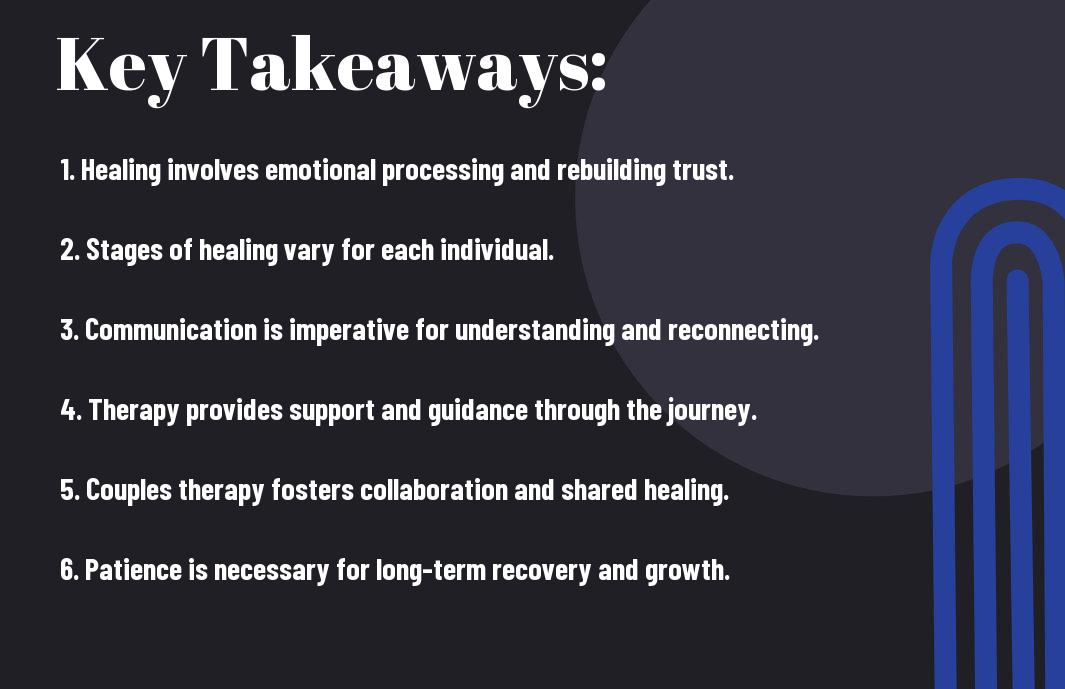There’s a complex journey ahead when dealing with the aftermath of infidelity, and understanding the stages of healing can significantly impact your recovery. You may experience feelings such as anger, betrayal, and confusion as you navigate this emotional terrain. Therapy can play an crucial role in helping you process these emotions, rebuild trust, and ultimately discover renewed connection and intimacy in your relationship. This blog post will guide you through the stages of healing and illustrate how therapeutic support can empower you to emerge stronger.
Key Takeaways:
- Infidelity typically results in a range of emotional responses, including anger, betrayal, and grief, requiring time to process.
- Healing from infidelity often follows distinct stages, such as shock, denial, anger, bargaining, depression, and acceptance.
- Open communication between partners is necessary for rebuilding trust and understanding feelings during the healing process.
- Therapy can provide a safe space for individuals and couples to explore their emotions and experiences related to infidelity.
- Working with a therapist can help to establish healthy coping mechanisms and facilitate productive discussions between partners.
- Setting boundaries and developing a plan for moving forward is an important part of the healing journey after infidelity.
- Ultimately, therapy can foster personal growth and improve relationship dynamics, guiding partners towards rebuilding their connection.

Understanding Infidelity
While infidelity can create emotional turmoil and disconnection in relationships, understanding it is the first step toward healing. It often stems from unmet needs, communication breakdowns, or individual struggles. Recognizing the complexities of infidelity will allow you to navigate this painful experience with greater clarity and compassion.
Types of Infidelity
Before delving deeper, it’s imperative to recognize the various forms infidelity can take:
| Emotional Infidelity | Developing deep emotional connections with someone outside the relationship. |
| Physical Infidelity | Engaging in sexual activities with another partner. |
| Cyber Infidelity | Using online platforms to engage in flirtatious or sexual interactions. |
| Micro-Cheating | Small, seemingly harmless actions that betray trust. |
| Serial Infidelity | Repeatedly seeking partners outside the committed relationship. |
Knowing the different types of infidelity can help you understand the true nature of the betrayal you’ve experienced and guide your healing journey.
Emotional and Psychological Impact
Among the significant consequences of infidelity are the emotional and psychological effects it can have on you. The betrayal can lead to feelings of anger, shame, and confusion, causing anxiety or depression. You may find it challenging to trust your partner or others again, impacting your future relationships.
At times, the emotional and psychological impact can feel overwhelming. The sense of loss and betrayal often manifests in anxiety, depression, and self-doubt. It’s imperative to acknowledge these feelings rather than suppress them. By doing so, you can foster self-compassion and take steps toward healing. Seeking therapy can also be beneficial, providing you with tools to process your emotions and rebuild trust, both within yourself and in your relationships.
The Stages of Healing
It is important to understand the stages of healing after infidelity, as acknowledging each phase can significantly aid your recovery journey. To explore Practical, Science-Based Steps to Heal from an Affair, allows you to move forward with greater insight and support.
Initial Shock and Denial
Beside the overwhelming emotions, you may first experience a state of shock and denial. This reaction can manifest as disbelief, leaving you reeling from the revelation and struggling to accept that infidelity has occurred.
Anger and Resentment
Among the common reactions is a surge of anger and resentment toward your partner. These feelings can often stem from betrayal, penetrating deep into the trust that once held your relationship together.
Initial responses may lead to heated arguments or withdrawal, as you come to terms with your emotions. You may find yourself replaying events in your mind, feeling a mix of hurt and frustration—this phase is important for recognizing the depth of your feelings.
Bargaining and Seeking Closure
Against the backdrop of emotional turmoil, you may engage in bargaining or seeking closure. This stage often involves questioning the relationship and revisiting moments in hopes of finding answers.
In addition, you might find yourself thinking about what you could have changed to avoid the hurt. This reflection can be a way to regain some control and understanding, though it’s crucial to approach it with compassion toward yourself.
Acceptance and Moving Forward
Among the final stages, acceptance and moving forward allow you to embrace your new reality. This transition involves acknowledging the past while focusing on your growth and future.
And, as you reach this stage, it’s important to foster resilience and recognize the lessons learned from the experience. Embracing this acceptance leads to healthier relationships and a better understanding of your needs moving forward.
The Role of Therapy
For those navigating the aftermath of infidelity, therapy plays a vital role in guiding partners through their emotional turmoil. A therapist provides a safe space where you can express your feelings, gain insights, and learn coping strategies. Therapy not only helps individuals process their pain but also facilitates healthier communication between partners. This holistic approach fosters healing, allowing you to reconstruct your emotional landscape after betrayal.
Individual Therapy for the Betrayed Partner
On your journey towards healing, individual therapy can be immensely beneficial. It offers you a confidential environment to explore the depth of your emotions, such as anger, grief, and betrayal. A therapist will guide you through understanding your feelings and help you develop coping mechanisms to regain your sense of self-worth and agency.
Couples Therapy for Rebuilding Trust
The process of rebuilding trust after infidelity often requires intentional efforts from both partners. Couples therapy serves as a structured setting for you and your partner to address underlying issues, communicate openly, and express feelings safely. Under the guidance of a therapist, you will work together to identify the reasons behind the infidelity, ensuring both partners feel heard and validated.
Individual therapy focuses on your personal experience of betrayal, while couples therapy emphasizes joint healing and accountability. This dual approach allows both partners to learn effective communication skills and practice vulnerability. As you engage in this *therapeutic process*, you can uncover deeper insights into your relationship patterns, enabling you to create a solid foundation for rebuilding trust and intimacy. By recognizing and addressing both personal and relational challenges, you’ll strengthen your bond and foster a healthier partnership moving forward.
Coping Mechanisms and Strategies
Many individuals experience a range of emotions after infidelity, which can lead to unhealthy coping mechanisms. Engaging in positive coping strategies can significantly aid in the healing process. By focusing on constructive actions such as journaling, exercise, or art, you can channel your feelings in a productive manner. It’s important to recognize how detrimental behaviors, like substance abuse, can impede your healing journey and to seek support when needed.
Effective Communication
Below are key strategies for communicating effectively during this challenging time. Expressing your feelings and needs openly with your partner is necessary for rebuilding trust. Use “I” statements to share your emotions without casting blame. Active listening is equally important; ensure you truly understand your partner’s perspective. This approach fosters a safe environment for discussion and enhances mutual understanding.
Self-Care and Support Systems
For your healing journey, establishing strong self-care habits and building a reliable support system is vital. Surround yourself with individuals who uplift you and provide a listening ear, whether they are friends, family, or support groups.
It is necessary to prioritize self-care by engaging in activities that nurture your mental and physical well-being. Simple practices like maintaining a healthy diet, exercising regularly, and setting aside time for yourself can have profound effects on your emotional resilience. Additionally, don’t hesitate to lean on your support system by sharing your feelings and experiences; this will help you feel less isolated. Seeking therapy can also provide you with professional guidance and techniques to navigate your emotions effectively.

Rebuilding Trust and Intimacy
Not every relationship can survive the aftermath of infidelity, but with dedication and effort, restoring trust and intimacy is possible. Both partners must commit to open communication and vulnerability. A therapist can guide you through this process, helping you to navigate difficult conversations and emotions. Healing takes time; patience is imperative as you work towards rebuilding your bond and rediscovering what brought you together in the first place.
Steps to Reconnect
For successful reconnection, start by actively listening to each other’s feelings and concerns. Acknowledge the pain and hurt caused by infidelity while remaining open to discussing your desires for the future. Engaging in shared activities can also help foster closeness, allowing you to create positive experiences and strengthen your emotional connection.
Setting Boundaries
Setting safe and healthy boundaries is vital for the healing process.
It’s imperative to establish clear and respectful boundaries within your relationship to protect both partners’ emotional well-being. Discuss what is acceptable and what is not, ensuring both parties feel secure and valued. This includes addressing triggers, maintaining transparency about interactions with others, and prioritizing time for each other. Consistently reaffirming these boundaries fosters a sense of safety, encouraging deeper emotional intimacy while also allowing you to regain trust and confidence in your relationship.

Long-Term Healing and Growth
After navigating the tumultuous waters of infidelity, healing transforms into a journey of long-term growth. This phase is about establishing a deeper connection with your partner and finding ways to enhance your relationship. It may involve setting new boundaries, improving communication skills, and fostering an environment of trust. Engaging in this ongoing process affirms your commitment to each other and allows you to build a healthier, stronger partnership moving forward.
Continuing the Journey Together
On this path, you and your partner can explore new ways to strengthen your bond. You might choose to engage in activities that bring you closer or develop shared goals that require teamwork. Celebrate your milestones, no matter how small, as these moments can reinforce your commitment to rebuilding your relationship. Open dialogues about your feelings will also help maintain transparency, nurturing a sense of security as you continue to grow together.
Learning from the Experience
The infidelity may serve as a turning point, prompting you to examine the dynamics of your relationship. Feeling the impact of this experience often sparks personal reflection and enables you to identify patterns that may have contributed to the situation. By confronting these elements, you can gain insights that promote healthier interactions. Taking this knowledge into your future with your partner will aid in avoiding similar pitfalls and fostering a more resilient, loving relationship.
Together, you and your partner can transform this painful experience into an opportunity for growth. Engage in open conversations addressing past hurts, and focus on constructive change. It’s important to recognize that you can use this moment to develop greater empathy and support for each other. Commit to understanding the factors that led to the infidelity and take action to ensure those patterns do not recur. As you both learn and evolve, you cultivate a deeper emotional connection and foster a relationship built on trust and mutual respect.
Conclusion
Summing up, understanding the stages of healing after infidelity is necessary for rebuilding trust and emotional well-being in your relationship. Therapy serves as a valuable resource, guiding you through complex feelings and providing strategies to address underlying issues. By engaging with a professional, you can navigate the emotional turmoil and foster healthier communication, ultimately leading to deeper connection and understanding. Prioritizing this journey ensures that you and your partner can emerge stronger and more resilient together.
FAQ
Q: What are the initial emotional reactions after experiencing infidelity?
A: The initial emotional responses to infidelity can vary significantly among individuals but often include feelings of shock, anger, betrayal, and profound sadness. Many may experience a sense of loss or panic, questioning the stability of their relationship and their partner’s commitment. These reactions are a natural part of coping with such a painful experience.
Q: How does the healing process unfold after infidelity?
A: The healing process typically occurs in stages and can differ from person to person. Initially, individuals may go through a phase of denial and confusion, followed by intense emotional turmoil. As time progresses, many start to engage in self-reflection, exploring their feelings and the relationship dynamics. Finally, with the right support, individuals can reach a stage of acceptance and growth, either moving forward together or independently.
Q: In what ways can therapy assist in the healing process after infidelity?
A: Therapy provides a safe environment for those affected by infidelity to express their feelings and thoughts. It facilitates open communication between partners, allowing for exploration of underlying issues that may have contributed to the infidelity. Furthermore, therapists can offer coping strategies, help rebuild trust, and guide individuals or couples towards understanding and healing, ultimately shaping a path forward.
Q: What role does trust play in recovery from infidelity, and how can it be rebuilt?
A: Trust is a foundational component of any relationship, and recovering from infidelity often requires significant effort to rebuild it. This involves open dialogue, accountability, and consistent actions that demonstrate commitment and honesty. Therapy can help couples identify patterns of behavior that eroded trust and work towards establishing healthier habits and open communication, crucial for restoring faith in one another.
Q: Can individuals heal from infidelity even if the relationship does not continue?
A: Yes, individuals can heal from the trauma of infidelity, even if the relationship ends. The healing process is centered on personal growth and self-discovery, allowing individuals to learn more about their needs and boundaries. Therapy can provide guidance during this transition, helping individuals process their emotions and develop resilience, assuring them that they can move forward in a healthy manner, regardless of their relationship status.
